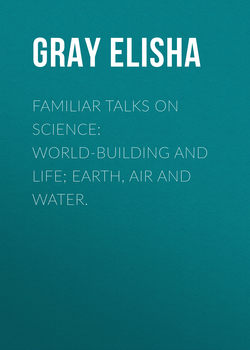Familiar Talks on Science: World-Building and Life; Earth, Air and Water.

Реклама. ООО «ЛитРес», ИНН: 7719571260.
Оглавление
Gray Elisha. Familiar Talks on Science: World-Building and Life; Earth, Air and Water.
INTRODUCTION
EARTH
CHAPTER I. WORLD-BUILDING AND LIFE
CHAPTER II. LIMESTONE
CHAPTER III. COAL
CHAPTER IV. SLATE AND SHALE
CHAPTER V. SALT
AIR
CHAPTER VI. THE ATMOSPHERE
CHAPTER VII. AIR TEMPERATURE
CHAPTER VIII. CLOUD-FORMATION – EVAPORATION
CHAPTER IX. CLOUD FORMATION – CONTINUED
CHAPTER X. WIND – WHY IT BLOWS
CHAPTER XI. WIND – CONTINUED
CHAPTER XII. LOCAL WINDS
CHAPTER XIII. WEATHER PREDICTIONS
CHAPTER XIV. HOW DEW IS FORMED
CHAPTER XV. HAILSTONES AND SNOW
CHAPTER XVI. METEORS
CHAPTER XVII. THE SKY AND ITS COLOR
CHAPTER XVIII. LIQUID AIR
WATER
CHAPTER XIX. RIVERS AND FLOODS
CHAPTER XX. TIDES
CHAPTER XXI. WHAT IS A SPONGE?
CHAPTER XXII. WATER AND ICE
CHAPTER XXIII. STORED ENERGY IN WATER
CHAPTER XXIV. WHY DOES ICE FLOAT?
CHAPTER XXV. GLACIERS
CHAPTER XXVI. EVIDENCES AND THEORIES OF AN ICE AGE
CHAPTER XXVII. GLACIAL AND PREGLACIAL LAKES AND RIVERS
CHAPTER XXVIII. SOME EFFECTS OF THE GLACIAL PERIOD
CHAPTER XXIX. DRAINAGE BEFORE THE ICE AGE
Отрывок из книги
"In the beginning God created the heaven and the earth. And the earth was without form, and void."
Whatever our speculations may be in regard to a "beginning," and when it was, it is written in the rocks, that, like the animals and plants upon its surface, the earth itself grew; that for countless ages, measured by years that no man can number, the earth has been gradually assuming its present form and composition, and that the processes of growth and decay are active every hour.
.....
The great chalk cliffs that are found on the coasts of the English channel are the work of a sea animal microscopic in size. At one time it was a question among scientists how these chalk cliffs were formed, but when the microscope was invented this mystery, as well as many others, was solved. The chemical components of chalk are precisely the same as those of limestone. The microscope shows that chalk is almost wholly a product of very small organized shells. The animals who are the architects of the chalk cliffs are called "foraminifera" – bearing shells perforated with little holes. The chief difference between chalk and limestone seems to be in the size of the shells of which they are respectively made up and in the manner of the bonding of these shells together. The shells in a lump of chalk are held much more loosely than those in a lump of limestone. These intrepid workers are still actively changing the structure of the bottoms of seas and oceans, and forming new islands, which in turn become the substructure that supports new life, animal and vegetable. And when we consider the great part performed by these microscopic architects and builders it is not a misnomer to speak of the building of a world.
Some time, long ago, some man made the discovery that what we now call coal would burn and produce light and warmth. Who he was or how long ago he lived we do not know, but as all earthly things have a beginning, we know that such a man did live and that the discovery that coal would burn was made. Coal, in the sense that we use the word here, is not mentioned in the Scriptures. According to some authorities, coal was used in England as early as the ninth century. It is recorded that in 1259 King Henry III. granted a privilege to certain parties to mine coal at Newcastle. It is further stated that seven years after this time coal became an article of export. In 1306 coal was so generally used in London that a petition was sent to parliament to have the use of it suppressed on the ground that it was a nuisance. Coal was used in Belgium, however, about 1200. There is a tradition that a blacksmith first used it in Liège as fuel. It was first used for manufacturing purposes about 1713.
.....